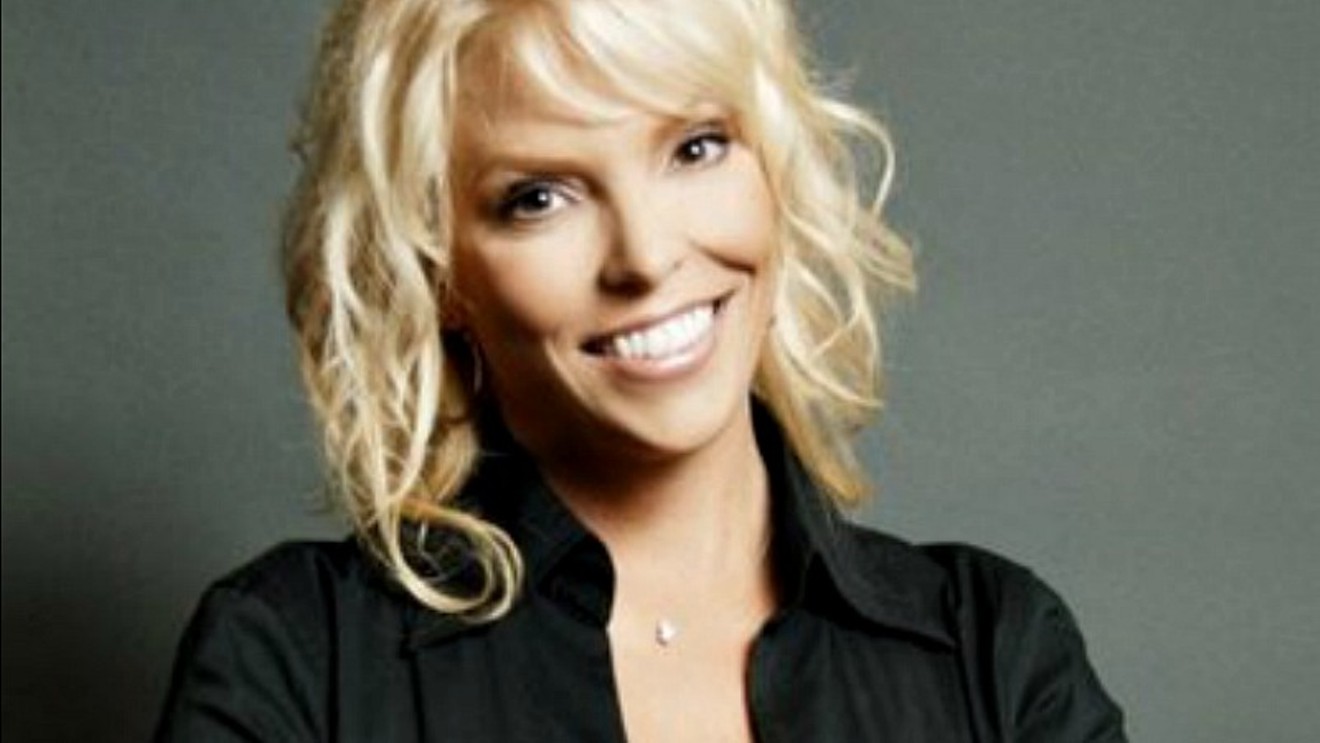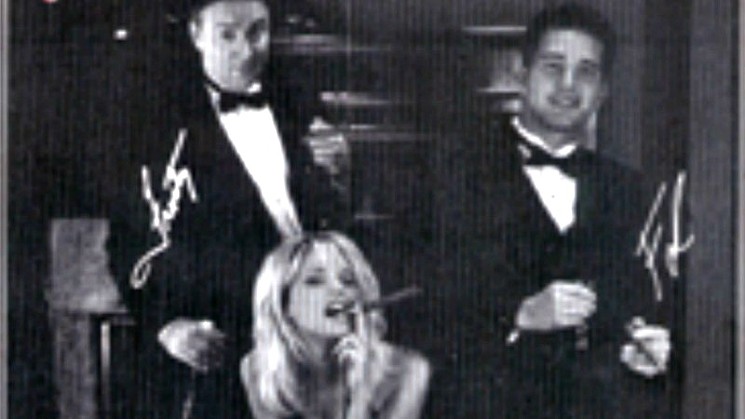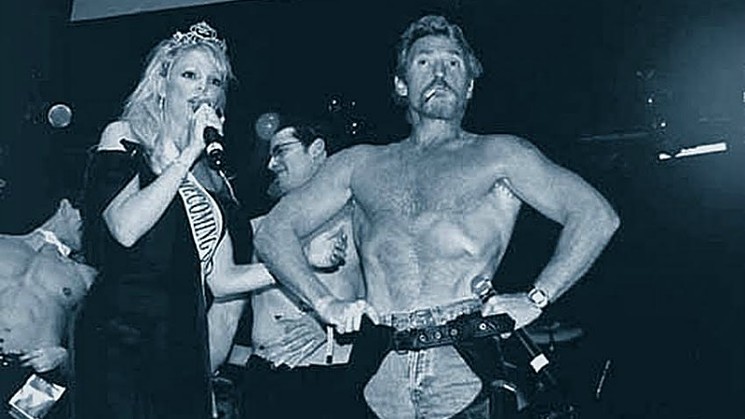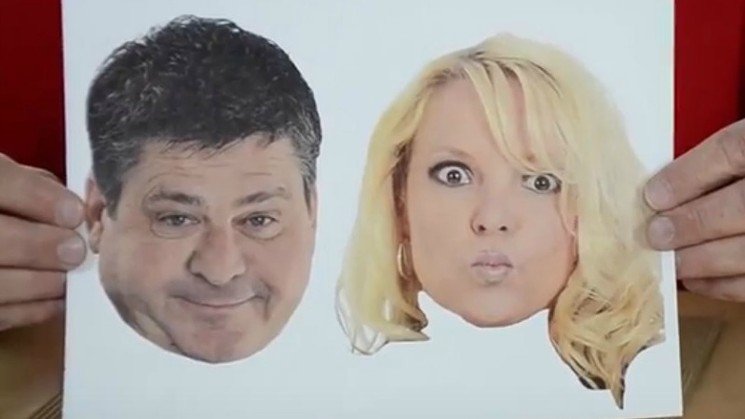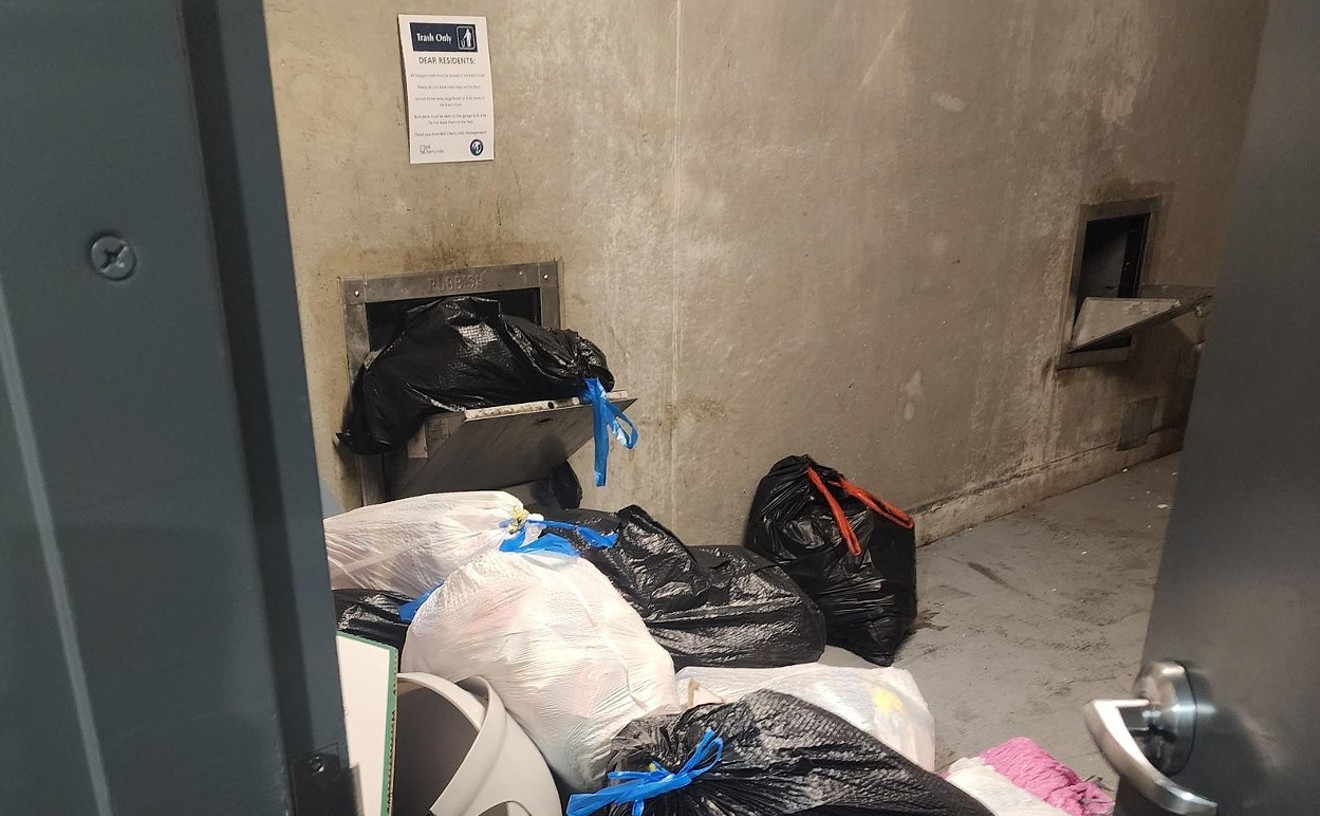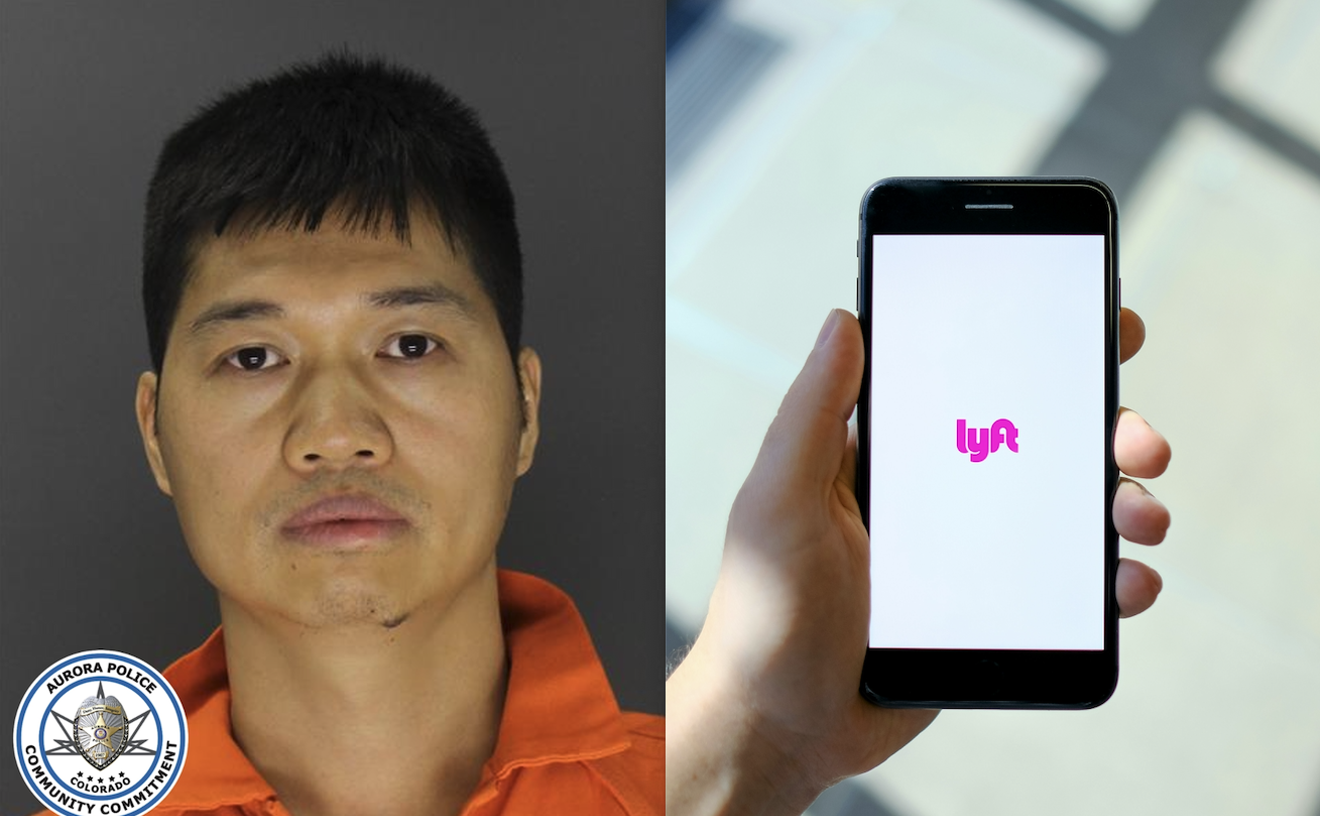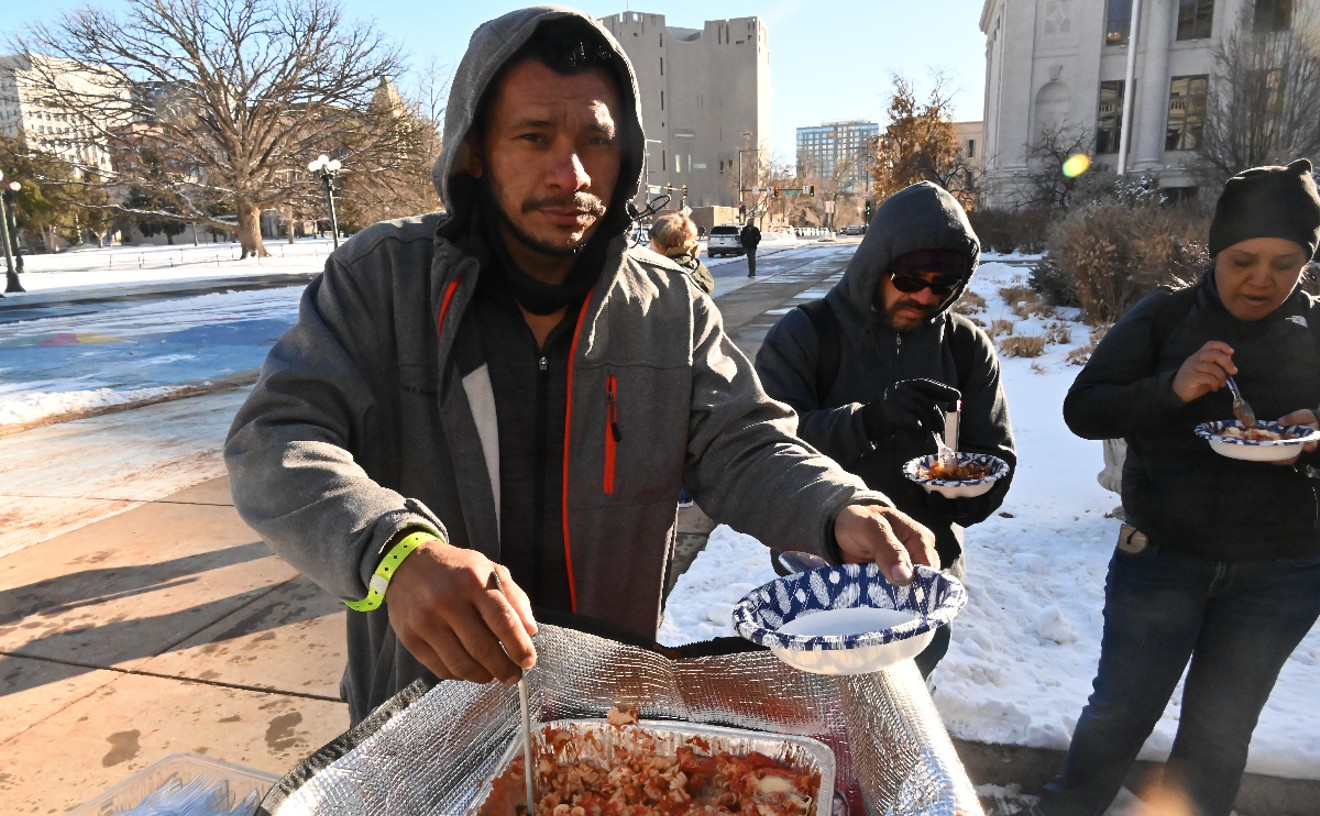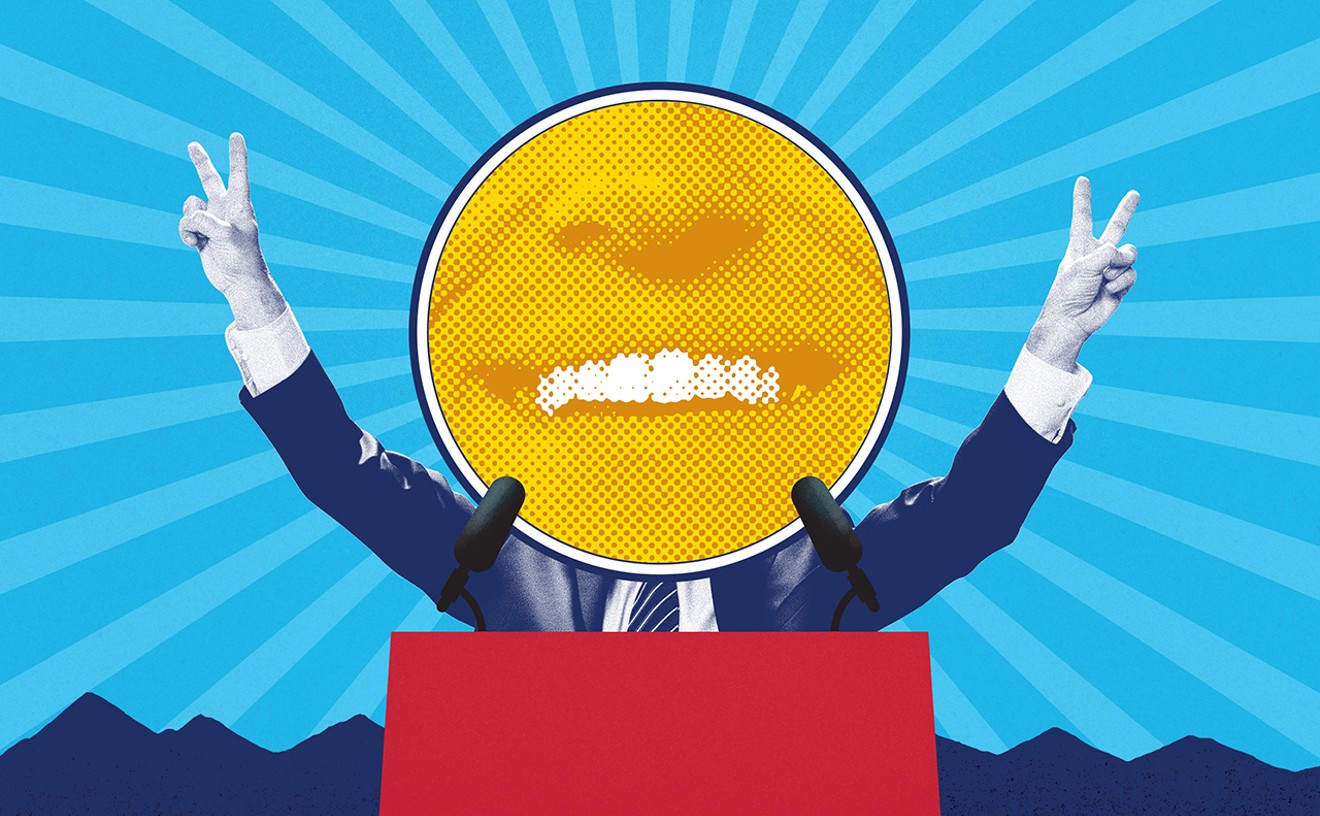During the conversation, White reveals how she went from being a nineteen-year-old model to a morning-show host known for dishing the dirt and talking about topics that are supposed to be off-limits in polite society (but everyone secretly loves to hear). She also discusses her Denver breakthrough in 1994 with partners Frosty and Frank, whose ribald, provocative and sometimes shocking content boosted ratings so much that the trio was exported to Los Angeles. The show, which continued to air in Colorado, too, was a smash — at least until 1999, when station management replaced Frosty and Frank with former Partridge Family star Danny Bonaduce in a shotgun marriage with White that still pisses her off.
The White-Bonaduce pairing was marked by Danny's bizarre mood swings, which she says were fueled by frequent falls off the wagon that she describes in surprising detail here. She also unveils plenty of secrets, like how she hosted a show in Sacramento for two years from Denver without any of her Colorado fans knowing it, and an initially mysterious illness that left her five-year-old son paralyzed from the waist down just as her return to Alice was getting under way. Somehow, though, she makes even this last episode seem funny — since, fortunately, it has a happy ending.
No, not that kind of happy ending.
Buckle up, because from here on out, White is in the driver's seat.
Westword: Could you take us through your various radio stops leading up to coming to Denver?
Jamie White: I started when I was nineteen in Kansas City, doing mornings.
Getting a morning gig in a major market at nineteen is pretty remarkable. How did that happen?
Just my amazing personality! [Laughs.] No, it's really silly. It's just the silliest story. I was modeling in St. Louis, and they said they needed a co-host in Kansas City to do this and that. So I auditioned, and I got the job.
What was the format of that show?
It was classic rock.
Were you able to let your personality out, or did you feel a little hemmed in?
It was a stereotypical back-in-the-day format. The girl just kind of laughed and went along with whatever these two guys were saying. I didn't really get to be me yet.
What was the first time you got to be you?
I would say that probably happened with my second job in Kansas City, when I went to the other rock station in town — and then I started doing afternoons with this guy. We did a talk show, and it was really fun. That's when I decided I had me inside of me.
You make it sound like Alien. Did you pop out of your own chest?
No! I've always been a little nutty-nutty cuckoo, but I had to be buttoned up with the two guys originally. But then my second partner in life, when I was still nineteen — he said, "You're pretty funny and crazy. Just go for it."
How did the audience react? Was it immediately positive, or did they take some warming up?
I think everyone was a little shocked that a woman could say what's on her mind and actually have a point and be funny. Everybody always says, "You say what I'm thinking but would never say." I just have fun. I don't get really serious about it — like, "Oh, my God, this is my career!"
Where did you go after leaving Kansas City?
I went to San Diego for a couple of years, and then I was in Phoenix for a couple of years. By this time, I guess I was 25, 26. Then I came to Denver, and that's when everything kind of exploded.
How did you and Frosty [Stillwell] and Frank [Kramer] first get together?
Alice was putting together a brand-new radio station, and they wanted a new morning show. They wanted three really different personalities, so they basically kind of interviewed us and threw us together and hoped for the best, and somehow it worked.
What was it about the way you guys interacted that worked so well?
I think we played off each other quite well. What did they call us: the dork, the doll and the dick? [Laughs.] I forget what the theory was. But Frosty was kind of the dork — he acted so intelligent and highly educated, played the stock market, straight guy. Frank was the cool guy, the womanizer. And I was the psycho. I was every psycho ex-girlfriend.
Back then, Denver was seen as more of a conservative radio market, and what you guys did wasn't conservative at all. Did the way Denver audiences reacted put the lie to the idea that the city was a little backward and old-fashioned compared to New York and Los Angeles?
I think Denver was really just starting to become Denver. It was so long ago, but back in the day, I think Denver was just starting to realize, "This is a cool city, and there's stuff to do here, and it's amazing." I was lucky, because it was a time when Denver started to become really open-minded.
You were so successful here that your show was moved to L.A. but also aired in Denver. What was that transition like?
I think the first time I got huge backlash was when Frosty and Frank and myself went to L.A. Oh, my God, people in L.A. hated me at first. We'd replaced a really mellow show that only did music, and then that audience all of a sudden heard me, and it was really shocking, like, "Oh, my God, what the hell just happened?" [Laughs.] But then after the audience turned over, we became the number-one show in Los Angeles for years.
You guys went on this incredible run in L.A. Was there a huge difference between being number one in Denver and being number one in L.A.?
This is going to sound strange, because there are so many big celebrities in L.A. — but the fans in Los Angeles were so crazy. The ones in Denver, I feel like I'm friends with people in Colorado. In L.A., it's different. It's this obsession kind of thing. I can't explain the difference, but in Denver, it's chill. Like, they're my friends, and I feel I could go out and have drinks with them. But in L.A., it's weird. I can't even explain it.
Rather than wanting to go out for drinks, you'd want to file a restraining order against them?
Yeah! You have security. You do. I don't know what it is. There, they want to touch you, and it's really odd. But here, it's just so chill and easy. There's not an idolization thing. It's just really cool here. There, it's scary.
After all your success in L.A., the station broke up the team even though you were at the height of your popularity. Does that make any sense, given that Danny Bonaduce was a celebrity in his own right? Or does it still confuse you all these years later?
I'm still not happy about it. They did it without my consent. I couldn't do anything about it. When they told me that they were letting Frosty and Frank go, they said Danny was under contract for a lot of money in New York.... They needed to save the money he was under contract for, because they didn't want him in New York, and they wanted to pair him with me in L.A. I left a voice-mail, which is so funny, because I'm now known for it — but I said, "You can take Danny Bonaduce and shove him up your ass."
We quoted that in our article at the time everything went down — and we also quoted you saying that radio was "a whore job" because you were so upset.
I was upset. I was mad. It wasn't fair. It wasn't fair to my partners, and it wasn't fair to how loyal I was to them. I wasn't allowed to tell them anything about it, so it was a real pickle that I was put in. I didn't think it was very nice, the way they handled the situation. I guess to them, it's big business. To me, I would never treat people that way. My company now, Entercom, is amazing and super-fair and I love them. But I think when billing was at its height and they had this $2 million contract or whatever Danny was making and they had to honor it and they wanted to put him in there.... But it did work. I will give them kudos for that. It worked, and it worked for a long time. But I know Frosty and Frank and I worked, too.
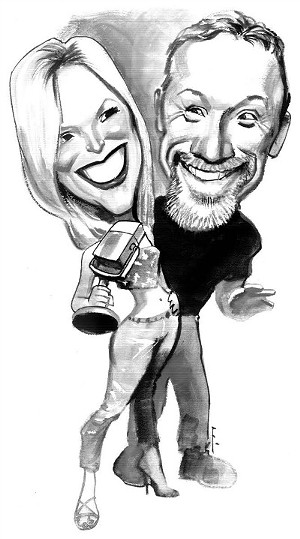
Jamie White and Danny Bonaduce looking happier to be together than they sometimes were in real life.
Illustration by Fred Harper
I feel like it was ten years. I feel like it was a hundred years.... But sometimes it was really fun. With Danny, it was really manic. You never knew when he was going to be sober and when he was going to be off the wagon. And sometimes when he was off the wagon, it was really fun. But sometimes when he was off the wagon, it was really dark and scary. With an addict, you just never know how it's going to play on certain days when they can't get it together. I think he went into rehab three times when we were together.
Did he have any tells, where he would do something and you'd realize, "This is going to go south," and you knew you had to be ready for the worst to happen?
Sometimes he'd tell us, "Haha, I didn't take my whatever drug. Today's going to be a crazy day." And sometimes when that happened, he'd be actually sleeping in the studio. I'd call my boss and say, "His eyes are closed. What do I do?" After he'd come out of rehab, he'd be really great for a year or two, and it'd be really solid and amazing. But sometimes he'd be upset that he wasn't on alcohol or drugs or whatever his beef was all the time. So it was a roller coaster.
What led to the post-Danny period?
It got to the point where it wasn't manageable anymore. I told my bosses I just couldn't do it anymore. It was getting a little scary. So they said, "Okay, what do you want to do?" And I said, "I can't be in that room anymore. It's such a zoo." So they let him go and then they switched formats. They were trying to do alternative, and I was still being paid off on my contract — and it was actually perfect timing, because I was pregnant, and so it was great. I got to have a kid and be paid a lot of money. I couldn't work for a year and a half; I wasn't allowed to work, because I had a non-compete contract.
So I hung out at the lake a lot — I had a place in Lake Havasu and had a little boy and had an amazing time. And then, all of a sudden, I realized, "This contract is going to run out soon, and I need to maybe find a job." Even though I was having the time of my life. And then Entercom said, "What do you want to do? Do you want to stay in Los Angeles?" And I said, "No, I want to move back to Colorado and raise my son in Colorado." So they said, "Okay, we'll build you a studio in Colorado, but we want you to send a show to Sacramento." And I said, "Great. I love it. I love you guys for doing it." And they said, "We understand. We get that you love Colorado." So I did a show for Sacramento from Colorado for a couple of years.
Would you run into fans on the street wondering, "What the heck are you doing in Colorado when I can't hear you here?"
All the time. It was funny. I'd be like, "I'm here, but I'm not here," but nobody got it. They'd be like, "Huh?"
How did you wind up getting back on Alice?
I was in the Entercom offices every morning, and then they said they wanted to make a change at Alice and would I be interested. And I said, "Yeah," because that's where it all started, thanks to a guy named Skip Weller, who's still in town; he was our general manager, and now he has an advertising agency. He's the one who said, "You just need to go for it with Frosty and Frank. Be crazy. Be who you are and you're going to really be something someday." Honestly, I owe my whole career to Skip Weller.
So anyway, I said I'd love to come back to Alice, and they come on with this big fanfare — and then my son got incredibly ill and was in Children's Hospital. Basically, three days after we start this brand-new show I was gone, because my son was at Children's.
What was the problem?
It took forever. They didn't know what it was. I can't remember what the condition was called, but basically one neighbor had strep throat and one neighbor had the flu, and he was such a little guy that he got both of them. But he wasn't presenting, so they couldn't figure it out. And then he basically became paralyzed from his waist down.
That's terrifying.
Oh my gosh, right? He couldn't walk around the house. He'd walk with his hands and just drag his legs behind him. But he didn't care. Little kids, when they're five, he thought it was kind of fun that he could walk around on his hands. But he's fine now.
How long did it take for them to figure it out and for him to regain the use of his legs?
He was in the hospital for ten days, and then he finally presented. I guess the blood vessels bleed and you see blood droplets on the outer thigh. And so when he presented with that, after they'd tried everything, they were like, "Oh, this is what he has. Yeah!" They put needles in his foot and he couldn't feel anything. But then they gave him a steroid, and three days later, he could walk. It was crazy.
How long were you off the air because of his illness? And how hard was it for you to go back and be funny after going through something like that?
I stayed on for a couple of days, but I was bawling every morning, and it was really uncomfortable and not so fun to listen to. So then I took a week off. But you've got to understand, there was this big fanfare — like, "She's coming back!" And I stay on for two days, and then I'm gone for a week. But after that, it was fine, because he was fine and I was so happy. It was just really weird timing to do this big tah-dah! and then I had to say, "Just kidding. I'm not really here."
Then they let Howie [Drummond] go. I'm known as the black widow in radio [laughs], because everybody I work with gets fired. Frosty and Frank got fired, then Danny got fired, then Erica [Cobb] got fired after I was in the building, and then Howie got fired. So I guess — well, yeah [laughs]. None of these are my fault! It's all corporate!
Even so, you've definitely been embraced again at Alice. With the station playing music that appeals to so many young people, did you find that you had a new, younger audience you had to introduce yourself to, in addition to people who remembered you from when you were on the air at the station before?
Do you want to know the saddest part of having a very long career? It's when people come up to you and say, "Oh, my God! My mom used to have to turn you down when I was in my car seat!" [Laughs.] And I'm like, "Yeah?" That's what they say: "I thought you were so funny when I was in grade school."
I'm sure they mean that as a compliment.
I know they do. But if somebody comes up to me who looks barely twenty years old, I'm like, "Let me guess. You loved me when you were in your car seat." It's kind of like they grew up with me and I didn't know that.
How has your style developed over time? Have you mellowed in any way? Or do you feel that you're the same person you were the first time you came on Alice?
I feel like I'm the same person. The only thing now is, I say things like, "I can't tell this story because it's eight o'clock in the morning and my son's in the car."
So you're censoring yourself, but only for a very specific audience.
Yeah! And then my partner, BJ [Harris], will say, "It's not just your kid in the car. It's every kid in the car." And I'll say, "Yeah, but my kid's in the car, and it's different when it's your mom." He's ten years old now, and the other day, he came to me and said, "Oh, my God, mom. Could you not talk about boobs? Somebody at school said you were talking about boobs and their mom heard you." And I said, "Everybody has boobs. You even have boobs. So I can talk about boobs." [Laughs.]
Did he accept that explanation?
He just rolled his eyes. I said, "How about you just don't listen? Listen to something else." He said, "I didn't even hear it. Somebody else heard it." And I told him, "Just tell them your mom is an actress on the radio."
You seem so spontaneous on the air. Have there been times when you've been too spontaneous and you've gotten yourself in trouble? Or do you have a governor switch, where you know how far to go but not too far?
Now, I'm much more cognizant of it. But you're just talking — talking a hundred miles an hour — and everybody can get themselves in trouble. But hopefully in your mind, you're smart enough to not let that happen.
What's the most memorable time when it did happen?
No comment [laughs]. Let's let all of that stay in the past. Everything's good. Let's just keep chugging forward.
There's the perception that with so much new technology, terrestrial radio is yesterday's news. But your audience is still huge. Does it feel like there are fewer people out there? Or does it seem there may be even more listeners, because you're also online?
I feel like there's triple the amount there used to be. We have a live text in-studio, and it's amazing how many times we hear from somebody saying, "I'm listening in Kentucky. I love you." Or "I'm listening in Minnesota." There are people we would never have been able to reach before, but now, because we have an online app, we reach so many more. It's just amazing. Like, Kentucky? Who would ever have thought of that? So I think the audience is bigger than ever.
Are some of these people folks who've heard you at various stations along the way? Or are they discovering you for the first time?
Some have moved away from Colorado and they'll say, "I'm so sad I can't listen to you anymore, but I follow your Facebook page." And then somebody else will say, "Hey, they have an app. Go listen there." And they're so excited, and there are so many that follow us from California, it's crazy. It's insane how many people listen from there.
Do you feel these people form a kind of community even though they're so far apart?
Yeah, because you have to be kind of special to get me (laughs). It takes a special kind of something to understand what I'm putting out there, so we're definitely a club.
A common criticism of you is, "She's so abrasive." But if you're so abrasive, why have you been on the air for decades?
That's the really funny part. We'll get a text that'll say, "I hate you, bitch. I'm never going to listen to you again." But what they don't realize is that we can see their phone number when they text us live. Then the next day, it'll be the same number saying, "I can't stand you. I'm never going to listen to you again." And I'm like, "Didn't you say that yesterday? You're still listening? I don't get it." Then I'll write them and say, "I remember yesterday you said you hoped I'd die and were never going to listen again, but here you are again." And they'll write back and say, "I'm sorry. I just wanted to see if you saw my text."
Does it matter to you if people love you or love to hate you?
What can I do about it? Obviously you want more people to love you, but I can't do anything about people who hate me. The thing is, with radio, it's free. You're not paying a cable bill. It's completely free. It's up to you to find something you love. If you don't love me, that's fine; go to one of our sister stations. There are plenty of choices out there. I'm not forcing you to listen and you're not paying to listen. So it works for both of us.
Do you still enjoy the process as much as you ever did?
Oh my God, yes. I'm the luckiest girl on the planet and I live in the most amazing state. I just can't believe how lucky I am. I really can't believe what a lucky, blessed person I am. It's been a really crazy career.

